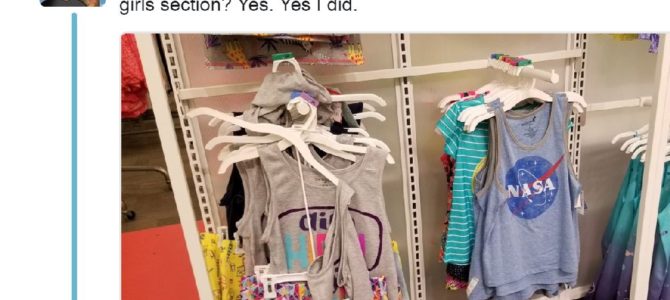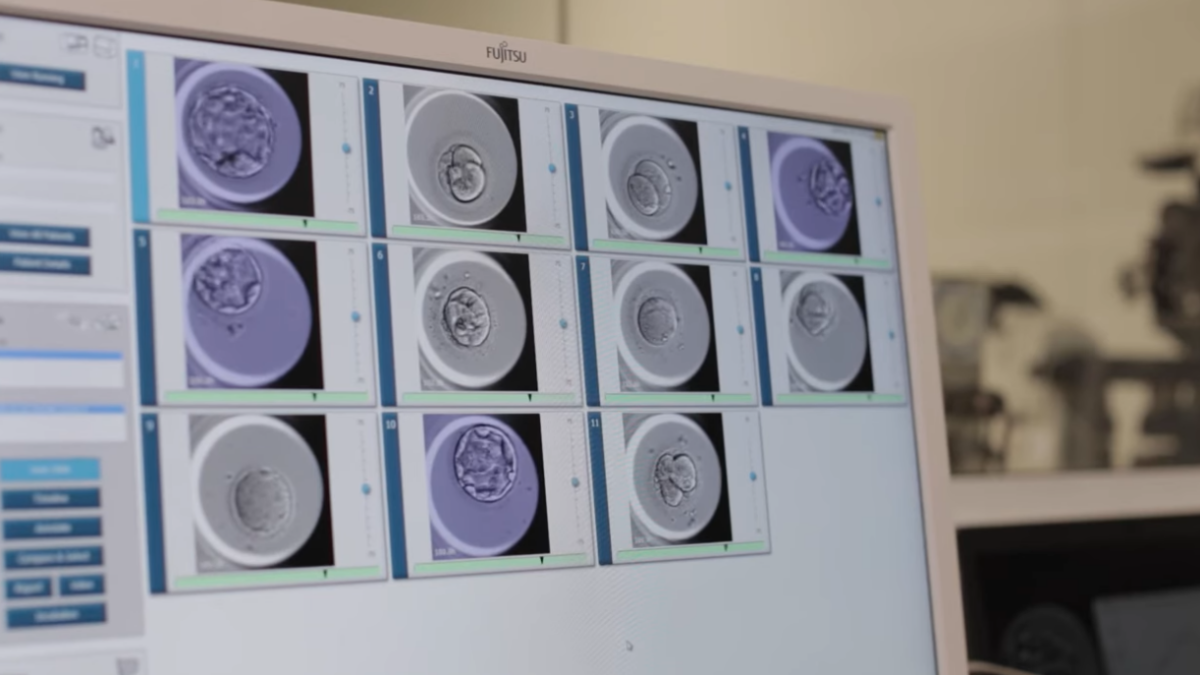Harvard University biologist Katie Hinde recently tweeted that she’d moved NASA tank tops from the boy’s to girl’s clothing section. The tweet garnered more than 120,000 likes and 24,000 retweets. We call that “going viral.”
Did I just take a bunch of NASA tank tops from the boys section & put them in the girls section? Yes. Yes I did. pic.twitter.com/hXHBbaog2W
— Dr. Katie Hinde (@Mammals_Suck) June 12, 2017
She followed up with:
Was also hoping to find a bunch of kickass Wonder Woman t-shirts in the girls section I could put into the boys section… Merchandisers: pic.twitter.com/npuLDAU0I0
— Dr. Katie Hinde (@Mammals_Suck) June 12, 2017
Target, which appears to be the store where Hinde moved the tanks, responded with a link to their science-themed girls’ shirts:
We aim to offer great selection & variety for every guest, & our tees are no exception. Check girls’ selection here: https://t.co/H78uBotimz
— AskTarget (@AskTarget) June 12, 2017
Item availability can vary from store to store and https://t.co/Gla4QrFOmf. Not all items are carried in all stores and on online.
— AskTarget (@AskTarget) June 12, 2017
One of her adoring fans replied, “Your [sic] my spirit animal.” Hinde wrote back:
Love the support, but ask that you use "patronus" instead bc using "spirit animal" is cultural appropriation.
— Dr. Katie Hinde (@Mammals_Suck) June 13, 2017
I thought that was a joke until I saw Hinde doubled down further in the thread:
But not the same bc appropriation of "spirit animal" is in the context of physical & cultural genocide https://t.co/S8Y572avYt
— Dr. Katie Hinde (@Mammals_Suck) June 13, 2017
Okay. There’s a lot of confusion here, but particularly confusing is that Hinde’s professional approach in her field — mammal lactation — is exactly opposite her behavior here. Take her comment on Time Magazine’s cover of a three-year-old child breastfeeding: “I thought it was unnecessarily inflammatory. I just thought it was a marketing gimmick, trying to stake a claim in the media Mommy Wars. And those Mommy Wars are just an incredible disservice to women, mothers and children and anyone who cares about these things.”
Someone with this much self-awareness in her field ought to be able to apply it more broadly—especially as someone for whom female scientists are obviously important. Switching a few tanks from one rack to another is likely to have zero effect on female interest in and pursuit of science. Lots of people wear tanks with, say, Chinese letters on them. How many of them actually go on to learn the Chinese language?
Hinde is an anthropologist, for Pete’s sake. She should realize that her “gimmicky” tweet is “an incredible disservice to women” in science, as it trivializes the hard work required to learn a scientific discipline, reduces “women in STEM” to posturing, and needlessly politicizes the sex of those who pursue scientific studies. Yet clearly she doesn’t.
We can’t entirely blame her, as Congress is also full of politicians who think government programs are needed to get people into an inherently fascinating and rewarding field where sex differences are driven by far bigger and deeper factors than sexism.
NASA is teeming with female scientists who didn’t need the special inducement of NASA-themed tanks easily purchased at Target to jumpstart their careers. Their stories are inspiring, and they bespeak lives of real challenges overcome, not complaining about the sexism in their childhood T-shirts.
Ramonda Yeh, for example, came to Brooklyn from the Ukraine at age 6 in the fifth generation of a deaf family. She knew no English when she started school at age 8, and couldn’t hear. She overcame these obstacles and has gone on to a breathtaking, inspiring life, becoming Miss Deaf New Jersey, riding for the U.S. cycling team in the 2013 Deaflympics, and mothering three children.
“If I could pass on one lesson to the next generation it would be this – we don’t grow when things are easy; we grow when we face challenges,” Yeh says. This is the message young women — and men — need to hear, whether they want to pursue scientific studies or not. Not “You can never be a scientist because even TARGET TANK TOPS prove the deck is stacked against you.” That defeatist attitude is, ironically, most likely to discourage young women from a vocation that requires particular grit.









